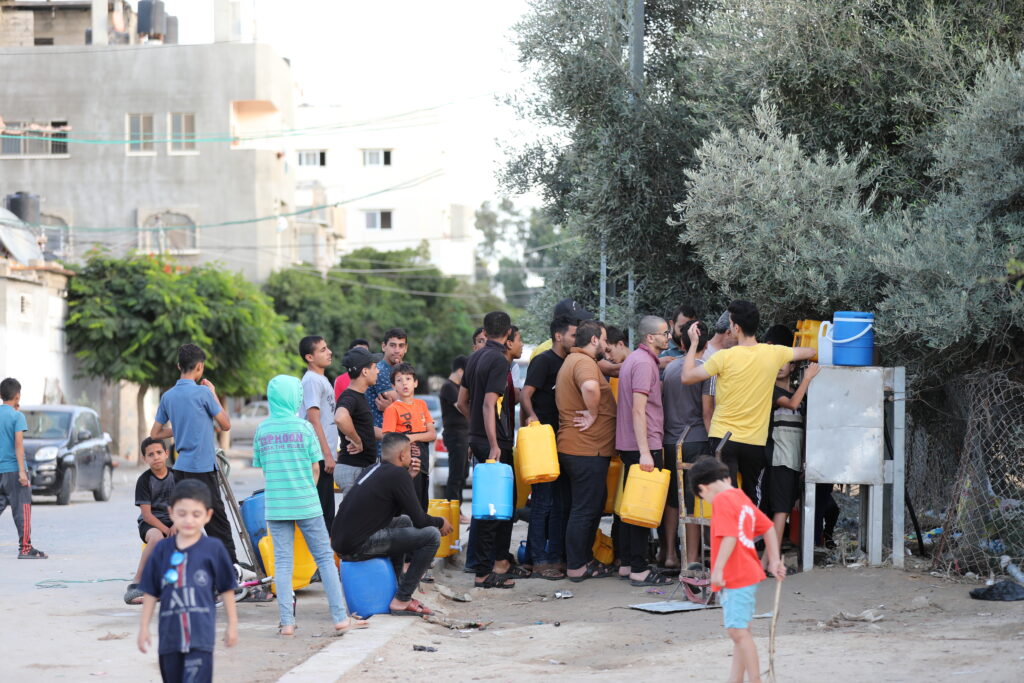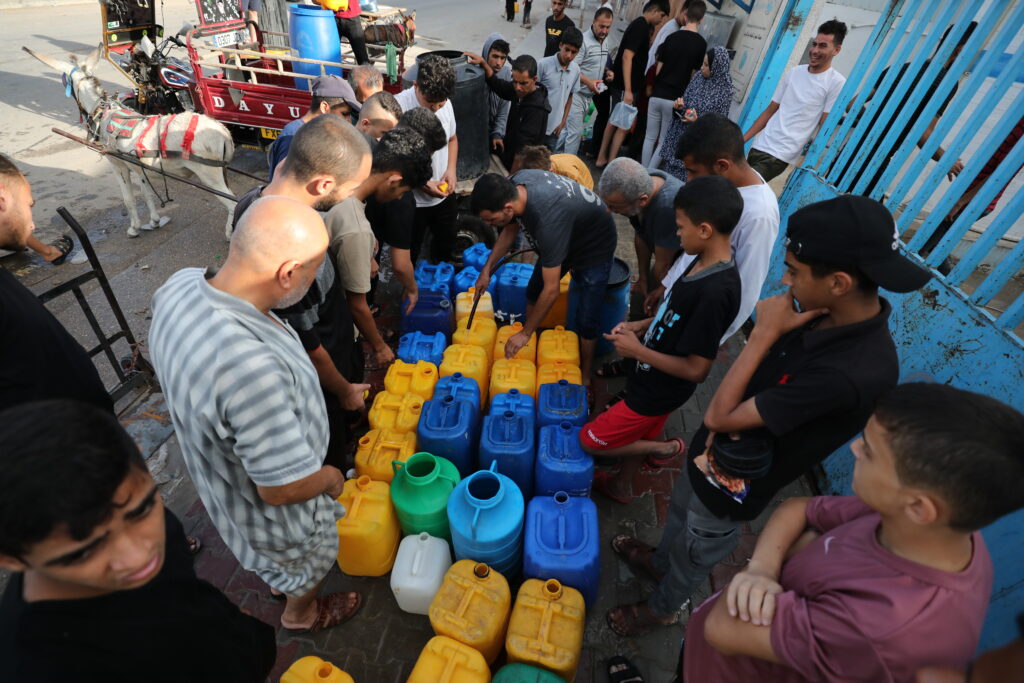Displaced and struggling to find water, an Islamic Relief worker* describes the hardships their family has faced since fleeing their home in Gaza.
I’m writing this on the second day after evacuating our home, following Israeli orders to move to the south of the Gaza Strip. The situation here is no different, bombing is still going on all the time and those of us who’ve evacuated are still not safe.
Just 30 minutes ago, an airstrike hit a house in the area to which people were advised to move. It left 12 people dead and tens more injured.
There is no safe place, and nowhere to escape the dire conditions, either.
I was lucky that I was able to bring my family to my parents’ house, but there are others who have brought their children, some newborn babies, south to find themselves without a roof over their head.
They’ve just had to set up on the streets – they have no shelter, water, food, toilets or other essential facilities. There are people like that everywhere.
For my family, the most pressing problem is water.

Without power, municipalities can’t pump water to the residential areas, so people are struggling to find enough to use. At my parents’ house there are now around 7 adults and 20 children – the need for water to wash, cook and clean is huge.
At my uncle’s house, above my parents’, there are around 30 uprooted families. There is a newborn baby that seems to cry all the time. I can imagine her mum is trying desperately to pacify her, but how can she do this in a crowded place without the privacy she needs? The time and space she has to breastfeed her child is very limited.
My brother-in-law has evacuated his family to one of the United Nations schools that became shelters when this escalation began. One of his brothers also has a newborn, for whom he can’t get diapers. The crowded shelters will almost certainly see an outbreak of diseases.
At my parents’ house, we found a pack of diapers left there from when our kids were young. We gave it to my brother-in-law to pass onto his brother. But no one knows where the next pack will come from.
Rationing
Families are now taking plastic gallon containers out with them in search of water. We managed to get 5 containers and went to a neighbouring area, where we filled them and returned home. The area we visited was lower lying so water could reach the faucets without needing to be pumped in.
Now we have a good amount of water for a couple of days, but my mum is taking extra measures. I’m sorry to tell you that we are flushing the toilet only 2 times a day, in the morning and at night, and we’re eating less food to avoid going to the toilet as regularly.
We wash for prayers only once or twice. My mum decided that only the adults can use water for this, the children will pray after performing tayammum [ritual cleansing without water]. She told the kids:
“Allah will accept your prayers, my beloved children, because you are innocent and pure”.
An exhausting search
Drinking water is another story. Most of us are at the point where we don’t care if the water is clean or not, we’re lucky to have any at all. I brought 2 packs of bottled water with me in the car when we came south, but it with so many of us in the house, it was soon used up.
We have a neighbour who has dug himself a well and was ready to pump drinking water to us, but there was no electricity to run the pump.

They rented a generator to solve this issue, but then could not find any fuel to run it. The neighbours visited all of the gas stations, but most of them had also run out of fuel. After around 3 hours of searching, the neighbours managed to start the generator and the pump, but we could still not get water directly to the houses.
There is no network connecting the neighbour’s well to our houses, so we ended up using a donkey and cart to carry a water tank to fetch the water. We made it to the door of our house but how could we unload such a heavy tank?
We had no choice but to use buckets to scoop the water from the tank and carry it into the house. This exhausting process happens every day now.
Every meal is carefully planned
Getting enough food to eat can be just as challenging. There are now long queues of people waiting at every bakery in the area. I don’t go, my brother-in-law brings us 2 packs of bread each day and tells me he has to wait around 2 hours for his turn to buy.
The bakeries have started giving people tickets for their share of bread each day to make sure there’s enough for everyone.
The children at my parents’ house – my kids, my brother’s kids, my 2 daughters’ kids – wanted chocolate spread for their breakfast. That was hard to come by, but we managed to find a couple of packets at a shop nearby.
For lunch, my mother and sisters prepare lentil soup. My mother has a pack of plastic bowls to serve the soup in to avoid more using more water for dishwashing. My mum is always thinking of meals that would use less water and fewer dishes.
On the second day of our stay with her, she made rice for us. Without electricity, things in the deep freezer have started to melt so my mum added some vegetables to the rice and a small portion of meat that day.
My brother-in-law is a taxi driver. He is putting his life in danger to take people where they need to go. But because he’s out, he always brings us things from the market. He even found someone who makes falafel, which was a huge and happy surprise for him and all of us in my parents’ house.
He brought some to us and everyone was happy that night. Even in this situation, small things can still cheer us up.
Fearful for the future
As I’ve been describing our daily routine these past few days, I can’t help but be struck by how challenging it is to do even the smallest things that people in the rest of the world can take for granted.
The ability to switch the lights on when you enter a room is a luxury in Gaza now. Being able to go to the toilet and properly wash yourself is a privilege. Even the idea of showering has started to seem fanciful, let alone being able to have a roof over one’s head and get a good night’s sleep, without bombing.
This can’t continue anymore, my dear readers.
I feel frustrated that the lives of Palestinians don’t seem to matter to the world. I do not want to dwell on this feeling, but I want to make it clear to those of you reading that with every minute that passes without a resolution, it becomes more certain that me, my family, my friends and anyone else you know in Gaza will die.
I had been thinking that we will have a huge amount of work to do and people to support when this escalation is over, but now, I think we might not have the chance. We might not live to do so.
Please help Islamic Relief to support people in desperate need in Gaza. Donate to our Palestine Emergency Appeal now.
*This blog is anonymised to protect the safety and security of our colleague.
Read the full series of blogs here.
Editor’s note: This blog was submitted amid a fast-changing situation on the ground, which has since continued to deteriorate. The information was correct as of the evening of Tuesday 17 October.










